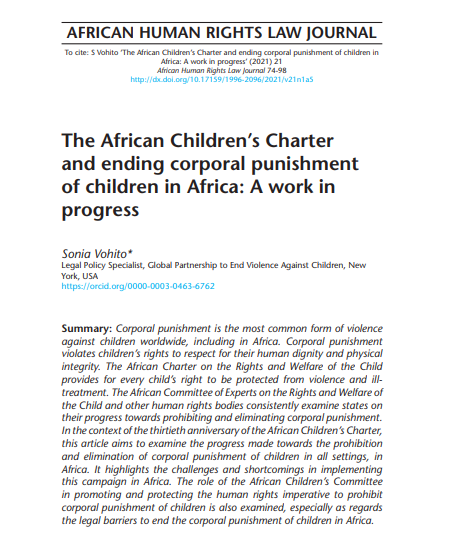The African Children’s Charter and ending corporal punishment of children in Africa: A work in progress
Just over 30 years ago, the African Children’s Charter called on states to protect children from violence, including corporal punishment – the most common form of violence faced by children across the world. Today, however, only 10 countries fully prohibit the practice, a fraction of the 54 states on the continent.
On the thirtieth anniversary of the African Children’s Charter, Dr Sonia Vohito, Legal Policy Specialist at the End Violence Partnership, examined the journey toward prohibition in Africa, along with the barriers that have been faced by those hoping to accomplish prohibition since the Charter’s birth.
“The ultimate goal [of this article] is to call on state parties to fully implement the African Children’s Charter by effectively protecting children’s best interests, including safeguarding their dignity and their physical and mental integrity,” said Dr Vohito.
In the article, Dr Vohito stresses the importance of harnessing national legislation to transform behavioral change. By prohibiting corporal punishment, children’s status in society is elevated, and newfound clarity is provided for parents, children, teachers, social services, and law enforcement that no violence against a child is acceptable.
“Reforming national legislation to achieve prohibition in all settings is a milestone achievement,” said Dr Vohito. “It sends a clear message to adults and children that corporal punishment is no longer acceptable and that the law protects children from all assault as it does for adults. Once prohibition is in place, states and societies must ensure its effective implementation in the best interests of the child to achieve an end to corporal punishment.”
Also highlighted are the laws, policies, and legal frameworks around corporal punishment in multiple African countries, along with the role of the African Children’s Committee in ending the practice, in addition to high-level court judgments and related case law.
“It has become evident that for the past 30 years, the African Children’s Charter and its monitoring body – the African Children’s Committee – are essential in the protection and promotion of children’s rights in Africa,” said Dr Vohito. “However, in order to ensure that no child is subjected to corporal punishment by 2040, as per Africa’s Agenda for Children 2040, more efforts will need to be made.”
Find out more about progress towards prohibiting and eliminating corporal punishment in Africa and the African Charter on the Rights and Welfare of the Child.
Find out about Pathfinding countries in Africa.

